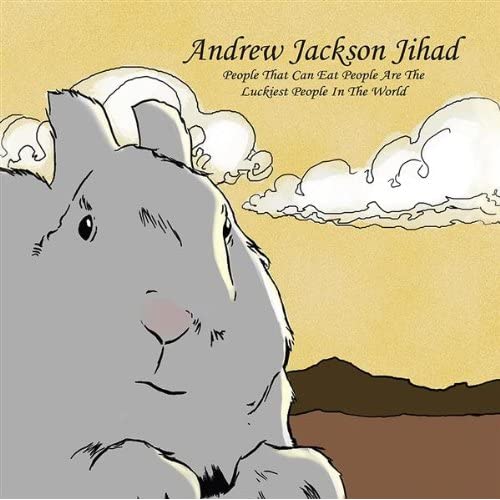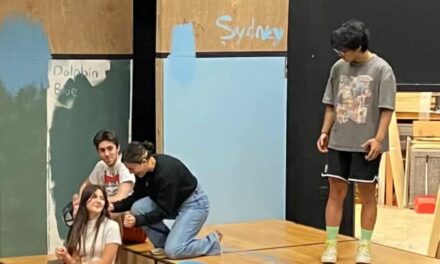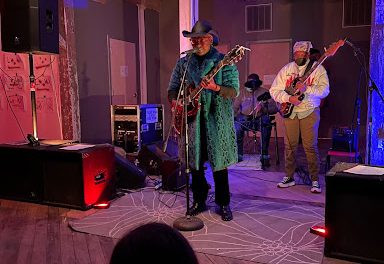
Courtesy of Asian Man Records.
Seventh Grade. Age Twelve.
Shaking, I sent the message.
After minutes on end of writing and rewriting, I worked up the courage to ask my close friend, who I was hopelessly smitten with, what her favorite songs were. I was hoping to impress her by listening to the same music.
She listed off songs, most of which were obscure and strange. Among them, “Brave as a Noun” by AJJ stood out. With the cryptic title, gruesome lyrics and half-shouting vocals, the song was unlike the sound I expected from music — palatable ballads about despair packaged in the clean sheen of professional studio recordings. No, this song was gritty, raw and ugly.
The song resonated with the little “tortured artist” I thought I was, though looking back on it, I definitely didn’t fully grasp it. Still, my newfound appreciation for “Brave as a Noun” marked a fundamental change in the way I viewed music: not just as something that sounds nice, but as something that forces you to confront yourself.
Eighth Grade. Age Thirteen.
I didn’t think about “Brave as a Noun” again for a while. I started listening to K-pop groups such as TWICE and BLACKPINK to impress my new crush. Music was a trusted tool to win the heart of my courtees.
Ninth Grade. Age Fourteen.
My high school career began, dread already festering within me.
Queer, Jewish and left-wing, I felt I didn’t belong in my Roman Catholic school. I grew into an antisocial, lonely and melodramatic creature stuck in a positive feedback loop of self-imposed misery.
I viewed myself as less of a tortured artist and more so just tortured, as I gave up my dreams of a career in art. I used music to enable my bad moods. Consequently, I returned to “Brave as a Noun.” The lyrics about cowardice, misanthropy and a life wasted fed the gloom I couldn’t shake.
Tenth Grade. Age Fifteen.
I trudged through ninth grade like it was sludge. When I reached tenth grade, it did not quell my longing for a fresh start. My problems did not magically disappear over the summer. Shocker!
Though I was fiercely insecure, I managed to make friends. One of those friends invited me to a concert for a band we both liked: AJJ. I was over the moon. I begged my parents to let me go, pleading my case as though my life depended. They allowed it.
I was excited for the concert, my first ever. Punks, goths and other people more knowledgeable about the scene would be there. In the hours leading up to it, I went to great lengths to look authentically cool, not like I was trying too hard. I curated the perfect outfit: black ripped jeans, a black tank top, a black denim jacket, black spiked boots and a black leather collar.
I was definitely trying too hard.
AJJ mostly played songs from “Good Luck Everybody,” their 2020 album. I knew none of the lyrics, but I tried to sing along anyway, absorbed by the crowd of fellow freaks and losers. After a slow, passionate ballad, AJJ finished off the concert with one last song: “Brave as a Noun.”
In an explosion of energy and sound, I was transported to another world for one-and-a-half minutes. In blurry, flashing still-frames, I caught glimpses of the stage, other people in the audience and my friend across the room. Gulping down breaths of air, I was subsumed by the sea of sweaty bodies smacking against each other. As I screamed the lyrics at the top of my lungs, the uproar carried my voice away. I melted into the chaos.
The most magical experience of my life was the euphoria of belonging and the relief of surrendering to the pandemonium around me. After the concert came to a close (way past my curfew), I returned home bruised and exhausted, but carefree.
Life sucks, except when it doesn’t.
Eleventh Grade. Age Sixteen.
I started going to therapy. I met my current partner. I drew. I formed a solid group of friends, a coalition of theater kids, atheists and anarcho-communists that stuck to each other like glue.
I found the time to listen to AJJ’s entire discography. Though I found albums and songs that resonated with me more at the time, “Brave as a Noun” held a special place in my heart — as my first AJJ song, my introduction to folk punk and a song that influenced so much of my youth.
Twelfth Grade. Age Seventeen.
As a director of two plays and the lead writer of an original, two-act musical, I felt as though I deserved the title of artist.
I attended another AJJ concert for the 10-year anniversary of “Knife Man,” my favorite album. I went with the same friend from 10th grade. I heard some of my favorite songs live. I witnessed my first bar fight. It was truly a night to remember.
College first year. Age Eighteen.
In retrospect, “Brave as a Noun” accidentally became the anthem of my youth. While I once revered it for being a pessimist testament to human failure, I now see it as a twisted inspirational ballad.
“In this life we lead, we could conquer everything/ If we could just get the braves to get out of bed in the morning”
I got out of bed this morning. It’s time for me to conquer the world.
Alexandra Kauffman (26C) is an English & Creative Writing major from Phoenix, Arizona. At the Wheel, she is an Emory Life section editor and Arts & Entertainment campus desk. Outside of the wheel, she is a member of Alloy Literary Magazine. She is also a science fiction enthusiast and enjoyer of the bizarre.





